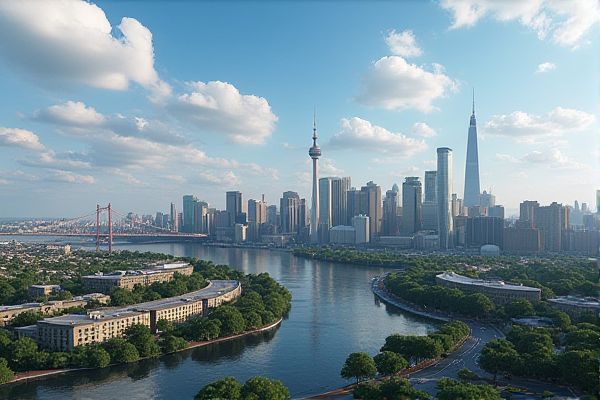
Insights from New Jersey residents and expatriate communities: Diverse cultures and vibrant communities. Cost of living considerations. Commuting options and public transport. Neighborhood safety and crime rates. Quality of local schools and education. Climate and seasonal weather patterns. Job market and employment opportunities. Recreational activities and attractions. Healthcare facilities and access. Real estate market and housing availability.
Diverse cultures and vibrant communities.
New Jersey is renowned for its diverse cultures and vibrant communities, reflecting a rich tapestry of histories, cuisines, and attractions. The state's multicultural population is evident in its ethnic restaurants, festivals, and cultural events, as well as its urban centers like Newark and Jersey City, which offer a blend of traditional and modern experiences. To learn more about this dynamic state, visit the New Jersey's dedicated page for more insights.
Cost of living considerations.
The Cost Of Living In New Jersey for international students and residents is relatively high, with average monthly expenses ranging from $1,625 to $2,250. These expenses cover accommodation, food, transportation, utilities, and entertainment, making it one of the more expensive states in the U.S. For more detailed information about living expenses, you can visit the Cost of Living in New Jersey webpage which offers a comprehensive guide on this topic.
Commuting options and public transport.
New Jersey residents rely heavily on NJ Transit, which offers extensive train, bus, and light rail options, including the Raritan Valley line and Somerset County shuttles, making commuting to Newark, New York City, and other local destinations convenient. The system is supported by the NJ Transit Mobile App, which provides ticket purchasing, real-time status updates, and delay notifications.
Neighborhood safety and crime rates.
New Jersey residents generally rate their neighborhoods positively in terms of safety, but perceptions vary widely based on demographics such as race, ethnicity, and socioeconomic status. While a majority feel safe, especially during the day, there are significant disparities, with urban residents and those in lower-income brackets feeling less safe and more worried about becoming crime victims. For more detailed insights into these perceptions, you can explore the comprehensive report on Rutgers University's website, which delves into the complex dynamics of neighborhood safety across the state.
Quality of local schools and education.
New Jersey's public schools are highly regarded, ranking as the best in the nation in terms of quality, with high scores in student achievement, school funding, and post-school success, according to reports from Education Week and other sources. The state's education system is praised for its strong performance, including high graduation rates and excellent math scores, making it a leader in educational outcomes. For more details on the accomplishments and initiatives in New Jersey's education sector, visit the Good News section of the NJEA website, highlighting these outstanding successes and innovations.
Climate and seasonal weather patterns.
New Jersey residents and expatriate communities experience a varied climate with distinct seasonal patterns, including hot and humid summers, mild autumns and springs, and cold, snowy winters. The state's climate is characterized by significant temperature fluctuations and occasional extreme weather events, such as heatwaves and heavy rains, which can impact daily life and require adaptation. For more detailed insights into these patterns, Moovaz provides a comprehensive guide on Climate and Weather in New Jersey.
Job market and employment opportunities.
New Jersey is experiencing a surge in layoffs, particularly among major corporations, despite a strong national job market. The state added 58,600 nonfarm jobs from August 2023 to August 2024, but layoffs in the private sector, especially in healthcare and pharmacy, are expected to continue, affecting job seekers and the overall labor market. For more details, visit Capital Analytics Associates.
Recreational activities and attractions.
New Jersey offers a diverse range of outdoor activities and attractions, including historic sites like Historic Smithville and the Weehawken Dueling Grounds, natural areas such as the New Jersey Botanical Garden and Watchung Reservation, and recreational spots like Van Saun County Park, Mountain Creek, and Liberty State Park, catering to various interests and seasons. Residents and visitors can enjoy beaches like Cape May and Ocean City, historic landmarks like the Princeton Battlefield State Park and Morven Museum & Garden, and family-friendly activities at places such as the Camden Waterfront and Liberty State Park, highlighting the state's rich history, natural beauty, and entertainment options. In Jersey City, expatriates and locals can explore cultural sites like the Liberty Science Center, Landmark Loew's Jersey Theatre, and Liberty State Park, which offers scenic views and recreational activities, making it a vibrant base for experiencing New Jersey's cultural and leisure offerings.
Healthcare facilities and access.
New Jersey residents encounter substantial disparities in accessing high-quality healthcare, with poorer access reported particularly by Black and Hispanic residents, younger adults, and those with lower incomes. This situation underscores the need for policymakers to address these inequities urgently. Meanwhile, in Jersey, expatriate communities have the option to access a public healthcare system funded through taxation and social security, provided they meet certain residency criteria. Additionally, private healthcare options are available, offering additional specialist treatments and reduced waiting times, although doctor visits remain privately funded.
Real estate market and housing availability.
The New Jersey real estate market in 2024 is anticipated to favor sellers, driven by high demand and limited inventory, with median home prices reaching $494,900. This tight supply is influenced by the state's strong economy, job opportunities, and significant population growth. Expats navigating New Jersey's housing market encounter a dynamic landscape shaped by regional variations and transportation infrastructure, where renting offers flexibility and lower initial costs, while buying provides long-term stability and potential for building equity. However, as new constructions and stabilized mortgage rates emerge, there is potential for a gradual shift toward a more balanced market. This outlook underscores the complexity of the region, as both new developments and economic factors play crucial roles in shaping the future of New Jersey's housing sector.
